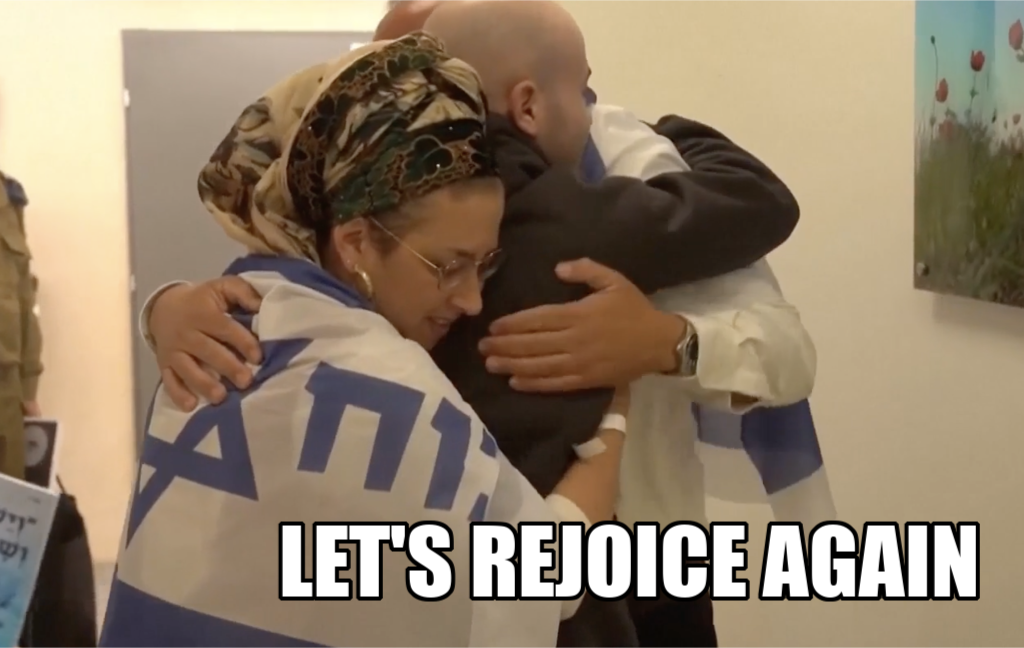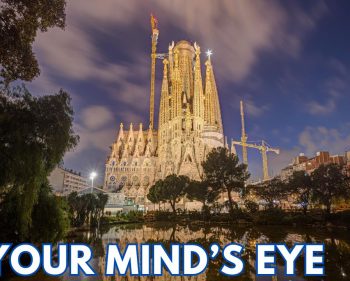LET’S REJOICE AGAIN

It’s hard to put into words what we’re feeling right now. After two years of anguish, fear, and uncertainty — after holding our collective breath through unspeakable pain — we are suddenly overwhelmed by joy.
The live hostages are all home. The war has finally ended. Families who lived in limbo can finally embrace again. Soldiers can come home without the anxiety of waiting for the next call-up. And an entire nation that has lived in the shadow of trauma can finally exhale.
And how fitting — how utterly perfect — that this moment of catharsis should arrive during Sukkot, zman simchateinu, the season of our joy.
Because if there was ever a time when joy felt stolen from us, it was Sukkot/Simchat Torah 2023. We can all remember so vividly how that sacred joy was shattered — when the evil of Hamas terrorists tore through our hearts.
I remember many of the photos of the places that were attacked, even weeks and months later, had sukkot in them. Sukkot that were never taken down, still standing forlornly in people’s gardens and yards. The sukkah, that fragile symbol of faith and safety, felt violated. I remember thinking, how could we ever sing ve’samachta be’chagecha in the sukkah again?
And yet — here we are. Singing again. Smiling again. Crying tears of gratitude instead of grief.
Of course it’s not a simple joy — it’s layered with pain, with memory, with the faces of those we lost. But it’s real. And it’s holy. And it’s the joy that comes after the storm, when the clouds finally part and we realize: the sun is still shining, and we’re still here. Am Yisrael chai.
There’s a famous experiment psychologists love to cite about happiness. Researchers asked people from dozens of countries, “On a scale of one to ten, how happy are you?”
The results of the study were surprising — or maybe not. The happiest people weren’t the wealthiest or even the healthiest. They were the ones who said they belonged to a community — the ones who felt part of something larger than themselves. Happiness isn’t found in isolation. It’s found in connection.
Rabbi Sacks once made a remarkable observation about the word simcha – “joy.” In Bereishit, Shemot, Vayikra, and Bamidbar, the first four books of the Torah, the word simcha appears just once in each book. Just once in the whole book.
Then comes Devarim. The word simcha appears multiple times. Twelve times, to be precise. Why is this word so important in Devarim, so relevant in Devarim, but in the other four books it barely appears? The answer, says Rabbi Sacks, is because Devarim is the book of partnership.
Until Devarim, God did everything. He guided, He protected, He fed. But as the Israelites prepared to enter the Land – to plant for themselves, to build for themselves, to fight for themselves — they became partners with God. And that, says Rabbi Sacks, is where true joy begins: not from being taken care of, but from taking part. If you are involved, you are happy.
And that’s exactly what we’ve witnessed over the past two years, and now with the ceasefire and hostage release. This redemption wasn’t the work of any one person. It was a team effort — of courage, of compassion, and of faith.
Politicians and diplomats negotiated tirelessly. Soldiers risked their lives to bring our people home. Families prayed and refused to give up hope. Communities like ours sent money, supplies, and boundless love, to ease the suffering of our brothers and sisters in Israel – especially the hostage families and the families of those affected by the massacre.
But perhaps most important of all, millions of Jews — from every background and every corner of the world — opened their siddurim and said Tehillim for people they didn’t even know. Which is why the joy we feel now is so deep and so meaningful. It’s Devarim joy — the joy that comes when we realize we are part of something bigger than ourselves.
And isn’t that what Sukkot teaches us? Of all the holidays, it’s Sukkot — the festival of leaky roofs and temporary spaces — that the Torah calls zman simchateinu. The Malbim explains that it comes after Yom Kippur, when we emerge cleansed and free, ready to start anew. But Rabbi Sacks adds: it’s the festival of participation. God gave us the ananei hakavod, the clouds of glory — but we were the ones who built the sukkot.
Joy, in Judaism, isn’t about what happens to us. It’s about what we do with what happens to us.
Ve’samachta be’chagecha — “You shall rejoice on your festival” — is an instruction, not a description or a definition. We are told to create joy, to build it out of faith and gratitude. And out of community.
On Pesach we were liberated by God. On Shavuot we were given the Torah by God. But on Sukkot we are proactive. Everything about Sukkot is proactive. And on Simchat Torah we take it one step further. We celebrate the Torah, not because we are told to do it, but because it’s what we want to do, together, as a community.
But there’s another layer to this week — one that comes to the surface when we say Yizkor. And it’s especially relevant as these two years end.
On Shemini Atzeret, we pause our joy and we remember. We remember the loved ones who were once here but are no longer with us. Family members, yes – but also Holocaust victims, soldiers who were killed, victims of October 7th – all of them.
At Yizkor this year, we won’t only smile about the hostages who have returned, we will also remember those whose names we said in our prayers for months, but who didn’t make it back.
And in that remembering — in that sacred pause — we will discover the fullness of simcha. Because Jewish joy has never been about ignoring sorrow. It’s about sanctifying it. Yizkor isn’t the interruption of our joy — it’s a kind of completion. It reminds us that love endures, that memory is eternal, and that the souls we honor are part of this moment too. Their sacrifices are written into the very fabric of our rejoicing.
So when we say Yizkor, let’s say it with hearts that ache — but also with hearts that overflow with joy. Because the tears we shed are not only for what we’ve lost, but for the miracle that we are still here, still together, still building, still a community, still believing.
That’s the true meaning of zman simchateinu. That’s the definition of Jewish joy — a joy that has walked through fire and come out singing.
Which is why we can say with a full heart and a smile on our face, through our tears: Hodu laShem ki tov, ki le’olam chasdo. Give thanks to God, for He is good; His kindness truly endures forever.

